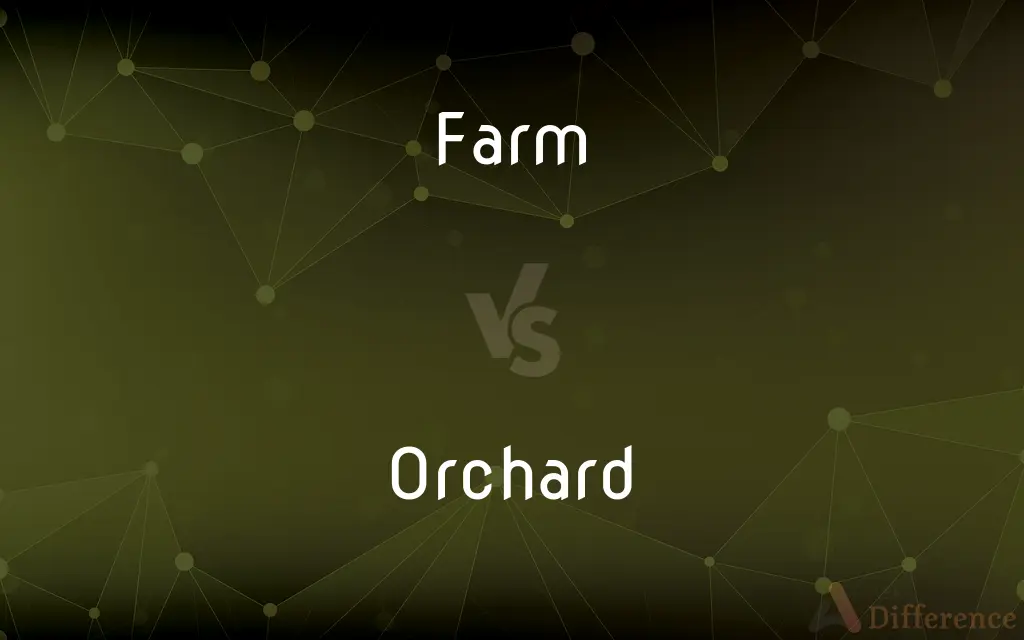Farm vs. Orchard — What's the Difference?
Edited by Tayyaba Rehman — By Fiza Rafique — Updated on March 25, 2024
A farm typically involves diverse agricultural activities, including crop cultivation and livestock rearing, while an orchard is dedicated to fruit tree cultivation.

Difference Between Farm and Orchard
Table of Contents
ADVERTISEMENT
Key Differences
Farms are broad agricultural lands focusing on a variety of crops and livestock, aiming for a wide range of agricultural production. Whereas orchards are specialized agricultural lands, dedicated to the cultivation of fruit trees, like apples, oranges, and cherries, emphasizing a singular type of agricultural practice.
Farming practices can vary greatly, from grain cultivation and vegetable farming to dairy and poultry farming, reflecting a diverse agricultural environment. On the other hand, orchard management is primarily concerned with the care of fruit trees, including planting, pruning, pest control, and harvesting of fruits, focusing on a more specialized form of agriculture.
While farms often employ a mix of mechanized and manual labor, depending on the type of agriculture and scale, orchards require specific knowledge in horticulture and often more manual labor for tasks such as pruning and picking, highlighting different skill sets and labor requirements.
Farms contribute to a variety of food products including grains, vegetables, meat, and dairy, serving as a primary source for a diverse diet. Orchards, however, mainly contribute to the fruit supply, specializing in the production of one type of food product but offering variety within the category of fruits.
The landscape of a farm can vary widely, including fields for crops, spaces for livestock, and potentially mixed-use areas for diversified farming practices. In contrast, orchards consist of systematically planted trees, often in rows for efficient care and harvesting, presenting a more uniform landscape.
ADVERTISEMENT
Comparison Chart
Focus
Diverse agriculture (crops, livestock)
Cultivation of fruit trees
Practices
Crop cultivation, livestock rearing
Planting, pruning, pest control
Labor
Mixed mechanized and manual
Often more manual labor
Product Variety
Grains, vegetables, meat, dairy
Various types of fruits
Landscape
Varied, including fields and livestock areas
Rows of fruit trees
Compare with Definitions
Farm
Landscape Variability.
The farm's landscape includes rolling fields, barns, and a small orchard on the side.
Orchard
Fruit Tree Cultivation.
Their orchard is renowned for its sweet, juicy apples.
Farm
Requires Mixed Labor.
The farm employed seasonal workers for harvest, besides their regular machinery operations.
Orchard
Labor-Intensive.
The orchard workers were busy picking ripe cherries by hand.
Farm
Agricultural Land.
The vast farm produced wheat, corn, and also raised cattle.
Orchard
Uniform Landscape.
Rows of neatly planted orange trees dominate the orchard's landscape.
Farm
Diverse Production.
Their farm grows both vegetables and houses a small poultry section.
Orchard
Specialized Agriculture.
Managing the orchard involves careful pruning and pest control for optimal fruit production.
Farm
Contributes to Various Foods.
From the farm to our table, we get our daily milk, eggs, and vegetables.
Orchard
Source of Fruits.
The orchard supplies local markets with organic peaches and plums.
Farm
A farm (also called an agricultural holding) is an area of land that is devoted primarily to agricultural processes with the primary objective of producing food and other crops; it is the basic facility in food production. The name is used for specialized units such as arable farms, vegetable farms, fruit farms, dairy, pig and poultry farms, and land used for the production of natural fiber, biofuel and other commodities.
Orchard
An orchard is an intentional plantation of trees or shrubs that is maintained for food production. Orchards comprise fruit- or nut-producing trees which are generally grown for commercial production.
Farm
An area of land and its buildings, used for growing crops and rearing animals
A farm of 100 acres
Farm workers
Orchard
An area of land devoted to the cultivation of fruit or nut trees.
Farm
Make one's living by growing crops or keeping livestock
He has farmed organically for years
Orchard
The trees cultivated in such an area.
Farm
Send out or subcontract work to others
It saves time and money to farm out some writing work to specialized companies
Orchard
A garden or an area of land for the cultivation of fruit or nut trees.
Farm
Allow someone to collect and keep the revenues from (a tax) on payment of a fee
The customs had been farmed to the collector for a fixed sum
Orchard
The trees themselves cultivated in such an area.
Farm
A tract of land cultivated for the purpose of agricultural production.
Orchard
A garden.
Farm
A tract of land devoted to the raising and breeding of domestic animals.
Orchard
An inclosure containing fruit trees; also, the fruit trees, collectively; - used especially of apples, peaches, pears, cherries, plums, or the like, less frequently of nutbearing trees and of sugar maple trees.
Farm
An area of water devoted to the raising, breeding, or production of a specific aquatic animal
A trout farm.
An oyster farm.
Orchard
Garden consisting of a small cultivated wood without undergrowth
Farm
A facility for the generation of energy by converting it from a particular source, usually by means of multiple electric generators
A wind farm.
Farm
A place where a group of similar devices or storage containers are set up
A tank farm.
A server farm.
Farm
(Baseball) A minor-league club affiliated with a major-league club for the training of recruits and the maintenance of temporarily unneeded players.
Farm
The system of leasing out the rights of collecting and retaining taxes in a certain district.
Farm
A district so leased.
Farm
To cultivate or produce a crop on (land).
Farm
To cultivate, breed, or raise (plants or animals).
Farm
To pay a fixed sum in order to have the right to collect and retain profits from (a business, for example).
Farm
To turn over (a business, for example) to another in return for the payment of a fixed sum.
Farm
To engage in farming.
Farm
A place where agricultural and similar activities take place, especially the growing of crops or the raising of livestock.
Farm
A tract of land held on lease for the purpose of cultivation.
Farm
A location used for an industrial purpose, having many similar structures.
Antenna farm; fuel farm; solar farm; wind farm
Farm
(computing) A group of coordinated servers.
A render farm
A server farm
Farm
(obsolete) Food; provisions; a meal.
Farm
(obsolete) A banquet; feast.
Farm
(obsolete) A fixed yearly amount (food, provisions, money, etc.) payable as rent or tax.
Farm
(historical) A fixed yearly sum accepted from a person as a composition for taxes or other moneys which he is empowered to collect; also, a fixed charge imposed on a town, county, etc., in respect of a tax or taxes to be collected within its limits.
Farm
(historical) The letting-out of public revenue to a ‘farmer’; the privilege of farming a tax or taxes.
Farm
The body of farmers of public revenues.
Farm
The condition of being let at a fixed rent; lease; a lease.
Farm
(historical) A baby farm.
Farm
(intransitive) To work on a farm, especially in the growing and harvesting of crops.
Farm
(transitive) To devote (land) to farming.
Farm
(transitive) To grow (a particular crop).
Farm
To give up to another, as an estate, a business, the revenue, etc., on condition of receiving in return a percentage of what it yields; to farm out.
To farm the taxes
Farm
To lease or let for an equivalent, e.g. land for a rent; to yield the use of to proceeds.
Farm
To take at a certain rent or rate.
Farm
To engage in grinding (repetitive activity) in a particular area or against specific enemies for a particular drop or item.
Farm
To cleanse; clean out; put in order; empty; empty out
Farm out the stable and pigsty.
Farm
The rent of land, - originally paid by reservation of part of its products.
Farm
The term or tenure of a lease of land for cultivation; a leasehold.
It is great willfulness in landlords to make any longer farms to their tenants.
Farm
The land held under lease and by payment of rent for the purpose of cultivation.
Farm
Any tract of land devoted to agricultural purposes, under the management of a tenant or the owner.
Farm
A district of country leased (or farmed) out for the collection of the revenues of government.
The province was devided into twelve farms.
Farm
A lease of the imposts on particular goods; as, the sugar farm, the silk farm.
Whereas G. H. held the farm of sugars upon a rent of 10,000 marks per annum.
Farm
To lease or let for an equivalent, as land for a rent; to yield the use of to proceeds.
We are enforced to farm our royal realm.
Farm
To give up to another, as an estate, a business, the revenue, etc., on condition of receiving in return a percentage of what it yields; as, to farm the taxes.
To farm their subjects and their duties toward these.
Farm
To take at a certain rent or rate.
Farm
To devote (land) to agriculture; to cultivate, as land; to till, as a farm.
Farm
To engage in the business of tilling the soil; to labor as a farmer.
Farm
Workplace consisting of farm buildings and cultivated land as a unit;
It takes several people to work the farm
Farm
Be a farmer; work as a farmer;
My son is farming in California
Farm
Collect fees or profits
Farm
Cultivate by growing, often involving improvements by means of agricultural techniques;
The Bordeaux region produces great red wines
They produce good ham in Parma
We grow wheat here
We raise hogs here
Common Curiosities
Can a farm have an orchard?
Yes, many farms include orchards as part of their diverse agricultural activities.
How do labor requirements differ between farms and orchards?
Farms may utilize both mechanized and manual labor, whereas orchards typically require more manual labor for tasks like pruning and harvesting.
How does the landscape of a farm compare to that of an orchard?
Farms have a varied landscape including fields and livestock areas, while orchards consist mainly of rows of fruit trees.
What is a farm?
A farm is an area of land used for diverse agricultural practices, including growing crops and rearing livestock.
Why might someone choose to run an orchard instead of a general farm?
Someone might choose to run an orchard for specialization in fruit production, which can require less space and potentially offer higher value crops.
What is the main focus of an orchard?
The main focus of an orchard is to grow and harvest fruit trees.
Are orchards considered a type of farm?
Orchards can be considered a specialized type of farm focused on fruit cultivation.
Can technological advancements impact farms and orchards similarly?
Technological advancements can impact both, through improved machinery for farms and better pest control or tree care techniques for orchards.
What defines an orchard?
An orchard is a piece of land dedicated to the cultivation of fruit trees.
What types of products are primarily produced on a farm?
Farms produce a variety of products including grains, vegetables, fruits, meat, and dairy.
What skills are important for managing an orchard?
Skills in horticulture, including knowledge of tree care, pest control, and fruit harvesting, are important for managing an orchard.
How do the economic models of farms and orchards differ?
Economic models differ in terms of scale, types of crops or trees, market demand, and labor costs, with orchards often focusing on niche markets.
What challenges do modern farms face compared to orchards?
Modern farms face challenges like crop diversity management, soil degradation, and market fluctuations, while orchards grapple with issues like disease management in trees and fluctuating fruit market prices.
What environmental considerations are there for farms and orchards?
Both farms and orchards need to consider soil health, water usage, and pest management, but specific practices will vary based on their operations.
How do climate conditions affect farms and orchards differently?
Climate conditions can affect crop selection and productivity on farms, while orchards may be more sensitive to temperature variations and water availability for specific fruit trees.
Share Your Discovery

Previous Comparison
Police vs. Doctor
Next Comparison
Dispute vs. DebateAuthor Spotlight
Written by
Fiza RafiqueFiza Rafique is a skilled content writer at AskDifference.com, where she meticulously refines and enhances written pieces. Drawing from her vast editorial expertise, Fiza ensures clarity, accuracy, and precision in every article. Passionate about language, she continually seeks to elevate the quality of content for readers worldwide.
Edited by
Tayyaba RehmanTayyaba Rehman is a distinguished writer, currently serving as a primary contributor to askdifference.com. As a researcher in semantics and etymology, Tayyaba's passion for the complexity of languages and their distinctions has found a perfect home on the platform. Tayyaba delves into the intricacies of language, distinguishing between commonly confused words and phrases, thereby providing clarity for readers worldwide.














































